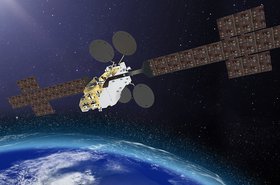Satellite firm SES has launched a satellite connectivity service for Department of Defense (DoD) customers using Amazon Web Services’ (AWS) new modular data center offering.
SES Space & Defense, a wholly-owned subsidiary of SES, this week announced the availability of satellite-powered network connectivity for AWS Modular Data Center.
The US DoD jointly-awarded the $9 billion Joint Warfighting Cloud Capability (JWCC) contract to AWS, Microsoft Azure, Google, and Oracle last year, after its predecessor JEDI contract was abandoned in the face of multiple lawsuits and legal challenges.
Earlier this year, AWS announced a modular data center offering for US Department of Defense customers under the JWWC contract.
The self-contained module comes in a ruggedized container designed for disconnected, disrupted, intermittent, or limited (DDIL) environments.
The system features internal networking, cooling, and power distribution equipment. It can be scaled with the deployment of multiple modular data center units.
Now, using SES’ Cloud Direct offering, SES Space & Defense can connect field-deployed AWS Modular Data Center and AWS Regions. If the modules are using terrestrial connectivity, customers can use satellite connectivity to provide network redundancy.
The service provides one-hop connectivity from the customer module to the AWS regions via SES’ Medium Earth Orbit (MEO) and Geostationary Orbit (GEO) satellites, including the new O3b mPOWER satellite system set to go live later this year.
President and CEO of SES Space & Defense David Fields said, “Our multi-orbit, multi-band satellite network delivers direct low-latency connectivity to AWS Regions, enabling mission success at the tactical edge. In a network-enabled battlefield, the ability to rapidly and securely extend cloud and edge computing into a tactical ecosystem in real-time is critical to our warfighters in theatre.”
AWS had previously said that once deployed, its modular data center needs to be connected to power, and networking if using AWS Outposts. If networking was unavailable, modules racked with Snow Family devices would allow customers to run workloads using a limited subset of AWS services.
This week also saw AWS launch a new rugged Edge appliance, known as SnowBlade, that is only available to DoD customers under the JWCC contract.
In other satellite news:
- The Nebraska Farm Bureau – an organization dedicated to supporting farm and ranch families in the state – has announced a partnership with SpaceX’s Starlink to provide broadband coverage across Nebraska, particularly in rural areas.
- Chilean ISP GTD is now an authorized Starlink distributor for Chile, Peru, and Colombia.
- OneWeb has partnered with the Connecting Alaska Consortium to provide connectivity to tribes and communities across Alaska.
- Kymeta has launched a new flat-panel antenna for OneWeb maritime customers.
- Inmarsat has partnered with Australia and New Zealand to deliver the Southern Positioning Augmentation Network (SouthPAN) to provide position services to the region from Inmarsat’s three new I-8 satellites in 2027.
- Japan Airlines has tapped Intelsat for an Inflight Connectivity (IFC) upgrade. Intelsat is to upgrade around 50 Boeing 737s and 767s to the company’s 2Ku IFC solution.
- Netskrt’s Edge content delivery network (eCDN) is being installed on Thales’ IFC offerings.
- Thales’ new Onboard Data Center offering for the airline industry has won a Crystal Cabin Award. The company said the blade servers offer 10x the storage of inflight entertainment servers.
- Viasat has won a US Air Force Research Laboratory contract. The satellite provider will provide on-orbit space relay connectivity for its ARBALEST program, which aims to demonstrate the military utility of LEO space relays over commercial high throughput satellites. Viasat will provide AFRL with a Ka-band space relay payload for integration into a spacecraft for the future AFRL mission.
- Rivada Space Networks, which is aiming to procure hundreds of satellites for its Ka-band communication network, is reportedly looking to secure funds from the US Ex-Im Bank.
“We will be using quite a lot of debt in this project,” Rivada CEO Declan Ganley said this week. “We are in discussions with US Ex-Im Bank. Ex-Im financing and debt is extremely competitively priced, and I would say that is one element that gives us a bit of an edge."







